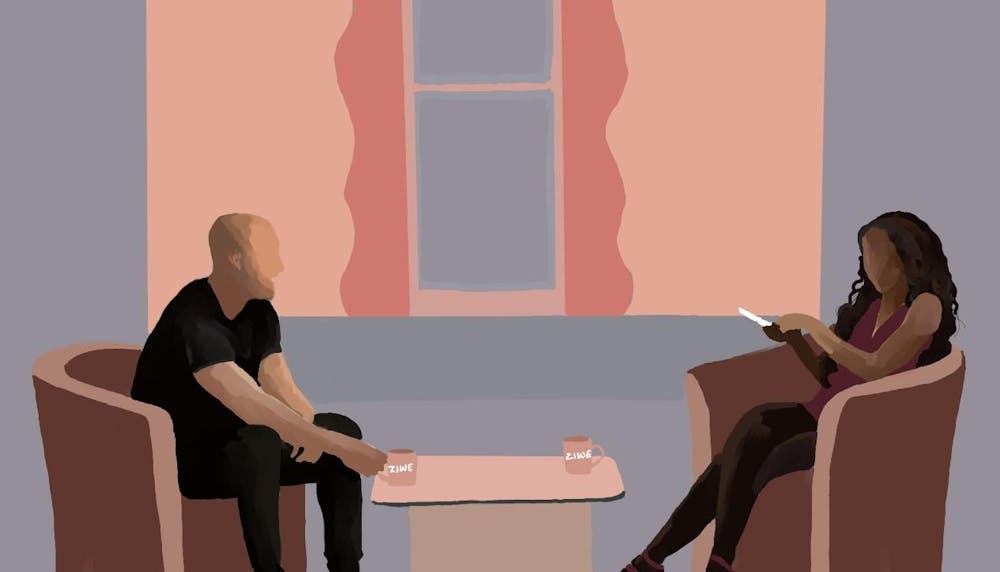Both casual and chronic social media users have been stumped with the same question for months — how did George Santos go from someone who illegally spent his political donors’ money on OnlyFans and Botox to an apparent icon earning six figures from fans buying personalized messages on Cameo? Looking into the current rise of the informal interview tells us more about how something like this could possibly happen.
The idea of the celebrity interview conjures up a formal scene of stuffy questions and tiptoeing around controversy in the name of keeping face. But internet shows and series such as “Ziwe”, Amelia Dimoldenberg’s “Chicken Shop Date” and Bobbi Althoff’s “The Really Good Podcast,” have created a new avenue for getting to know celebrities, one that is much more honest and informal.
This more informal type of interview involves awkward, personal questions and conversations that sound more “real,” mimicking a conversation between friends or, on “Chicken Shop Date,” two people on a first date.
On “Chicken Shop Date,” host Amelia Dimoldenberg asks fun questions which range from personal to comedic, such as “Are you a romantic person?” and “Do you have a favorite cinema snack?” Another well-known example is comedian Ziwe Fumudoh’s show titled “Ziwe,” which pairs lighthearted questions with brutal and pointed inquiries that make her interviewees squirm.
Mack Brumbaugh, a graduate student in the Media Studies department, said he found Ziwe’s content specifically to be the most enjoyable due to its brutal honesty. Brumbaugh said he enjoys the way she candidly asks public figures questions like “As an ally, would you ever feature a Black woman on your records?” and “What advice do you have for young diverse people with personality disorders considering a career in politics?”
“She kind of asks the questions I feel like everyone is kind of wondering about, and she kind of calls people out for their behavior, which I feel like you don't really see very much with celebrities,” Brumbaugh said.
The rise of informal interviews and the predicament of relatability, making viewers wonder why exactly these influential people are subjecting themselves to answering these uncomfortable, and sometimes loaded, questions. Brumbaugh gave further insight regarding why exactly they might be eager to be featured.
“I think a lot of it comes down to gaining visibility and holding visibility in this new era of social media where virality is kind of central,” Brumbaugh said.
Brumbaugh also mentioned Crystal Abadin — a professor at Curtin University in Perth, A.U. who specializes in internet studies. Abadin’s work links TikTok and today’s internet culture to Physicist Michael Goldhaber’s term “attention economies,” which refers to limited attention spans, and the way internet personalities must constantly build on their slice of attention to remain well-known online.
Goldhaber says “true modesty or humility” is very hard to maintain in an attention economy where people must go to great lengths to remain culturally relevant. However, informal interviews may actually be a way to relieve celebrities of this issue.
Brumbaugh further explained how these informal, humorous interviews resonate with younger generations who have grown up in this internet “attention economy,” and are familiar with the type of sarcastic, raw humor that hosts like Ziwe, Bobbi and Amelia exhibit. Soundbites from these interviews have gone viral on social media platforms, especially on TikTok, where users can easily spread short clips of interview content.
As much as informal interviewing can make celebrities appear approachable and honest, Brumbaugh pointed out a big generational difference in the perception of these interviews.
“I think a lot of older audiences just don't get it and thus kind of feel almost embarrassed and ostracized from it,” he said. “So I think because of that, television just really isn't the platform for these kinds of interviews.”
This is especially true for second-year College student Audrey Hanger. For her, this kind of intimate, perhaps awkward, interview model provides celebrities a venue to show the modest, humble side of themselves.
“I think that [informal interviews] can make them look more human or more like a normal person than people perceive them to be … because they have such strong internet presences,” Hanger said. “I feel like that it kind of brings them down from being idolized.”
Tapping into the internet’s formatting and appealing to younger generations perhaps is what makes these interviews effective and powerful, sometimes for the worse in Brumbaugh’s opinion. Brumbaugh noted the well-known Ziwe and George Santos interview, which occurred after the media storm that followed his expulsion from Congress, as an example of this.
Santos’ quirky and carefree mannerisms — which are what turned him into an idol of sorts for those captivated by his soundbites featured on cable news and social media platforms — were on full display in his roughly 20-minute interview with Ziwe. According to Brumbaugh, the charming and humorous way that Santos is portrayed in the video can be a dangerous thing.
“It just totally disconnects him from the kind of awful things that he did and puts him on this pedestal as a figure to be … supported somewhat for what he's done,” Brumbaugh said.
Ultimately, a lot of power lies in the hands of the informal interviewer, and the choice of which celebrities should have a platform is an important decision. By appealing to younger, more internet-dependent audiences, the informal interview is a novel way to connect and motivate groups in our detached world and should be seen as deeply ideologically powerful.







